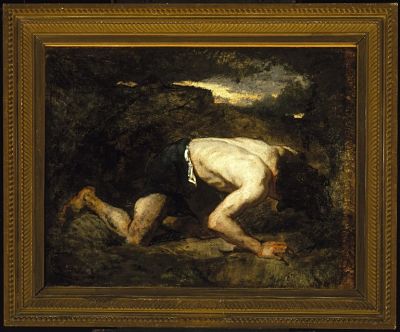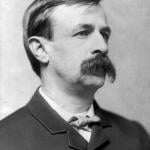 Great Solomon, son of David, was a patron to artists because he was wise and rich. Serving his wisdom ennobled the man blessed enough to serve him. Wicked Jezebel was a king’s daughter, but her wealth corrupted those who honored her for her power.
Great Solomon, son of David, was a patron to artists because he was wise and rich. Serving his wisdom ennobled the man blessed enough to serve him. Wicked Jezebel was a king’s daughter, but her wealth corrupted those who honored her for her power.
Christian culture is one that honors the patron: the noble man, blessed by wealth, who gives out of his virtue. To that patron, the rest of us can render service and honor. We do not honor the gold ring, but the golden heart that is most praiseworthy and essential, because so rare. Rich men are not rare: patrons are very scarce. We cannot have as a patron the boastful, litigious man who builds wealth on suffering.
The patron, the Christian gentleman or lady (to use the terminology of another time!) is worthy, because they are truly a gentleman or lady. Read any Trollope novel.
The Christian community that thinks that money is a sign of success has confused the worldly with the eternal, a spirit antithetical to the message of the Savior. He said the poor are blessed and that wealth is a great burden when it comes to salvation.
If there is one thing that Scripture, tradition, and history teach us, it is that mere money making is no virtue. Imagine a church foolish enough to honor a rich man because he is rich! Pity any community that would decide that boasting of wealth is a virtue or an accomplishment worthy of honor and the highest position. Surely no Bible believing church would do this since:
My brothers, show no partiality as you hold the faith in our Lord Jesus Christ, the Lord of glory. For if a man wearing a gold ring and fine clothing comes into your assembly, and a poor man in shabby clothing also comes in, and if you pay attention to the one who wears the fine clothing and say, “You sit here in a good place,” while you say to the poor man, “You stand over there,” or, “Sit down at my feet,” have you not then made distinctions among yourselves and become judges with evil thoughts? Listen, my beloved brothers, has not God chosen those who are poor in the world to be rich in faith and heirs of the kingdom, which he has promised to those who love him? But you have dishonored the poor man. Are not the rich the ones who oppress you, and the ones who drag you into court? Are they not the ones who blaspheme the honorable name by which you were called?
I have known many who have been blessed with wealth who are humble and scorn “partiality.” They do not view wealth as a merit or boast of it as an accomplishment. Instead, they have great souls, modest spirits, and are a delight to the poor. They do not rush to courts or quickly sue.
Saint James has rightly called those who dazzle with gold rings and who quickly call on the lawyers our enemies.
This is obvious, but Scripture and great literature are never merely obvious. Scripture teaches us to pity the man who has nothing but riches to commend him, because salvation and happiness are so hard to achieve. Shakespeare drives this point home in his collaborative effort: Timon of Athens.
Timon is a rich man, honored in the city for his feasts and great generosity. He lives by debt, gives great gifts, and ends up surrounded by flatters. When his wealth departs, his power and friends vanish, save for one faithful servant. In a twist, he finds gold and is rich again, but his disillusionment with his city and with humankind is too great and he dies.
Pity the rich man and pity the city who honors him for his prosperity. Does anyone wish to live surrounded by flatterers and false friends? Timon is lucky enough to grow poor, so he can see that those he loved were not worthy of his affections. Sadly, it is too late for Timon because his city has not built on his good qualities, but instead fed his folly. How? Timon has the makings of a good man, a generous man, but Athens teaches him that friendship, power, and favor come only with ostentatious spending of gold.
He has a friend, but he does not know it, because his true friend refuses to flatter him.
Timon thinks he can buy love, but discovers he cannot. This kills him . . . unable to see that he had (all along!) one true friend. Jesus tells a similar tale when He discusses the rich man and Lazarus: it is the rich man we should pity. He was destined by God to be a patron, but we reduced him to a cash cow by making him swollen, vain, and self-satisfied by our flattery.
The city pays more dearly than even Timon because it takes what might have been a great man and reduces him to an embittered rich man. They use him and when they need him, he is gone. They end up in the power of the tyrant Alcibiades.
The city that has no worthy patrons, that honors the rich for riches, will be reduced to jobs. Timon has characters with no names. They are known only by their roles or work. The Christian patron raises up those he blesses. The vulgar rich demand that their slaves abase themselves.
Timon learns his folly in this life, Lazarus in the place of the dead. Both are pitiable, but worse is the city or community that flattered, stroked, and cajoled them into the belief that their gold made them good and that God could be bought by sudden, impetuous gifts.
Timon of Athens has a counterpart in the brilliant work of the American genius Frank Capra. There the humble man, George Bailey, uses what wealth he has to help the poor and the working class. He lives simply and refuses to bow the knee to Potter, the powerful rich man in the town. He will not give up Bedford Falls to Potter. When he faces ruin (brought on by Potter), he discovers he has true friends. His virtue, not his money, have made him the “richest man in town.”
George Bailey is a patron and so saves Bedford Falls from falling into the hands of Potter.
Again, the lesson is not that of the socialist or the covetous man. Money is not evil in itself. Good men may use money (as George Bailey did) to do great good. Every good thing I have done has had benefactors standing (often anonymously) in the wings making good possible. I honor them, but not so much for the gift, but the humble charity.
They have never demanded the highest seat and their wisdom is not because of wealth, but their wealth came through their wisdom. God be thanked.
And so the lesson of Saint James and of Timon of Athens is simple: show no preference based merely on money. Do not honor “money making” as if it automatically is a good thing, flatter, or give false friendship to the rich.
Charles Williams, at the end of a poem has this haunting line: “send not, send not the rich empty away.” Salvation is difficult for the rich and they need our prayers and not our flattery. Our calling (if we are not wealthy) is to be a true friend to our patrons, but refuse any patron who only has wealth.
Athens killed Timon by flattery, but killed herself by destroying a possible patron and leader. She ended chastised, having lost her liberty. Timon wrote his own epitaph:
Here lie I, Timon; who, alive, all living men did hate:
Pass by and curse thy fill, but pass and stay
not here thy gait…
God send us patrons and may we not misuse those you send. May we honor them for their golden souls and not their gold, rendering them faithful service. May we reject the bully and the braggart. Lord have mercy: send not, send not, any of us empty away.
———————————————————-
William Shakespeare went to God four hundred years ago. To recollect his death, I am writing a personal reflection on a few of his plays. The Winter’s Tale started things off, followed by As You Like It. Romeo and Juliet still matter, Lady Macbeth rebukes the lust for power, and Henry V is a hero. Richard II shows us not to presume on the grace of God or rebel against authority too easily. Coriolanus reminds us that our leaders need integrity and humility. Our life can be joyful if we realize that it is, at best, A Comedy of Errors. Hamlet needs to know himself better and talks to himself less. He is stuck with himself so he had better make his peace with God quickly and should stay far away from Ophelia. Shakespeare gets something wrong in Merchant of Venice . . . though not as badly as some in the English Labour Party or in my Twitter feed. Love if blind, but intellectualism is blind and impotent in Love’s Labours Lost. Brutus kills Caesar, but is overshadowed by him in Julius Caesar. We should learn not to make Much Ado about Nothing. We might all be Antony, but if we would avoid his fate then we must avoid flattery and the superficial love of Troilus and Cressida. We are fools, but our goal should be to accept it and not to degenerate into Biblical fools during our Midsummer Night’s Dream. Richard III is a symptom of a bad leadership community, but be careful that use Measure for Measure to guide your reaction to the mess. The modern university is Iago in Othello playing on our sins to destroy the nation. You can’t accumulate your way to a great leader and personal piety in Henry VI (Part I) is not enough to make a great king. God will save the King, not our stupid partisan squabbles seen in Henry VI (Part 2) and not kingmakers as existed in Henry VI (Part 3). Fortunately, in God’s world All’s Well That Ends Well. Two Gentlemen remind me that being in love is grand. King John keeps winning and so loses. Slander always gives way to truth in Cymbeline. We need patrons, but God help us if we flatter them and lose them as Athens did with Timon of Athens.











